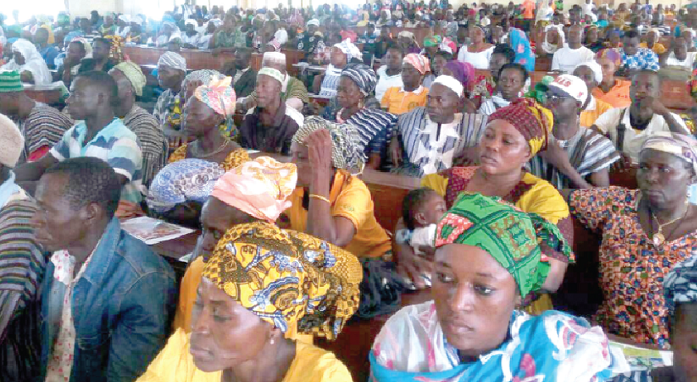
MEDA advocates land tenure reforms in Upper West
Speakers at a forum in Wa have called for a safer land tenure system to protect the occupation of women farmers who form a big size in rural agricultural production.
It is estimated that rural women constitute between 50 per cent and 70 per cent of agricultural workforce in Ghana, and the speakers called on traditional leadership at both the family and community levels to devise methods to make farmlands in the hands of women more secure for their productive activities.
Advertisement
They said land security allows women to plan their agricultural activities more effectively to improve their yields and increase their incomes.
Land ownership is mainly in the hands of men in the Upper West Region, and in some cases, women do not have the right to even inherit from a husband or father. Land inheritance, in some cases, goes to the first male child, and when the man has no male child, his brother will inherit it.
Critical factor
The Country Programme Manager of Mennonite Economic Development Associates (MEDA), Karen Walsh, said the land tenure system had become a critical factor that would impact Ghana's efforts to achieve food security and food sufficiency targets.
She said given the role women play in Ghana's agricultural production and related economic activities, the country would be better served if friendlier land tenure system exists to protect farmlands in the hands of women farmers.
“It is not just an issue of having land, but having land for a secure and sustained period of time,” she said.
The forum was organised by the Mennonite Economic Development Associates (MEDA) – an international economic organisation – through the Greater Rural Opportunities for Women (GROW) project to discuss land tenure issues bothering women.
Read Also: Asokwa Police brutalise Kantanga Hall students (VIDEO)
MEDA implements the GROW project – which promotes women's economic empowerment – in eight of the 11 districts of Upper West Region, with the active support of Global Affairs Canada.
The forum brought together chiefs and queen mothers, landowners, members of Women in Agricultural Development, male gender activists, officers of the Ministry of Food and Agriculture, GROW's lead farmers, community elders, and opinion leaders.
It was also attended by women who worked with MEDA's key facilitating partners, namely ProNet North, Partnership for Rural Development Action (PRUDA), Tumu Deanery Rural Integrated Development Programme (TUDRIDEP), Community Action for Rural Development (CARD) and Capacity Enhancement and Community (CAPECS), all local non-governmental organisations based in the Upper West Region.
With over 1,000 participants crammed into one hall at the Wa Campus of the University for Development Studies, it was easily the biggest forum on land tenure system in the history of the region.
Under the GROW project, MEDA – through its key facilitating partners – supports the women to farm in particular soya beans which supplies high nutritional content to families and provides an assured source of income to the women farmers.
Improved soya production
Over the last five years, the GROW project has grown its base with women from a modest 236 women at the beginning of the project to 21,378 women farmers in eight districts of the region harvesting 7,169 tonnes of soya beans from 13,689 hectares in 2016.
“One of the critical issues of their success is the issue of land. Without land they cannot grow soya,” she added.
She said if women were assured of ownership of land for five to 10 years, they would be able to farm to benefit their families and the whole region.
“We are looking at changing the entire way agriculture is done in Upper West Region,” she said.
“We don't grow soya beans because they are there; we do this because we are market-based. We want our women to till the soil, not only to consume it, but also to sell it. And what we have seen is incredible. We have seen the incidence of food insecurity drop, women are able to buy uniforms and send their children to school.”
The Executive Director of the Centre for Conflict Transformation and Peace Studies (CECOTAPS), Rev. Father Clement Aapengnuo, said it was time to create the appropriate environment around landownership in the Upper West Region that would recognise women's contribution, particularly in land use for agricultural production.
The Director of ProNet North, Martin Dery, said society conveniently avoid issues about land despite the importance of the subject, suggesting also that traditional practices of old when women were given priority in land distribution had been abandoned.



